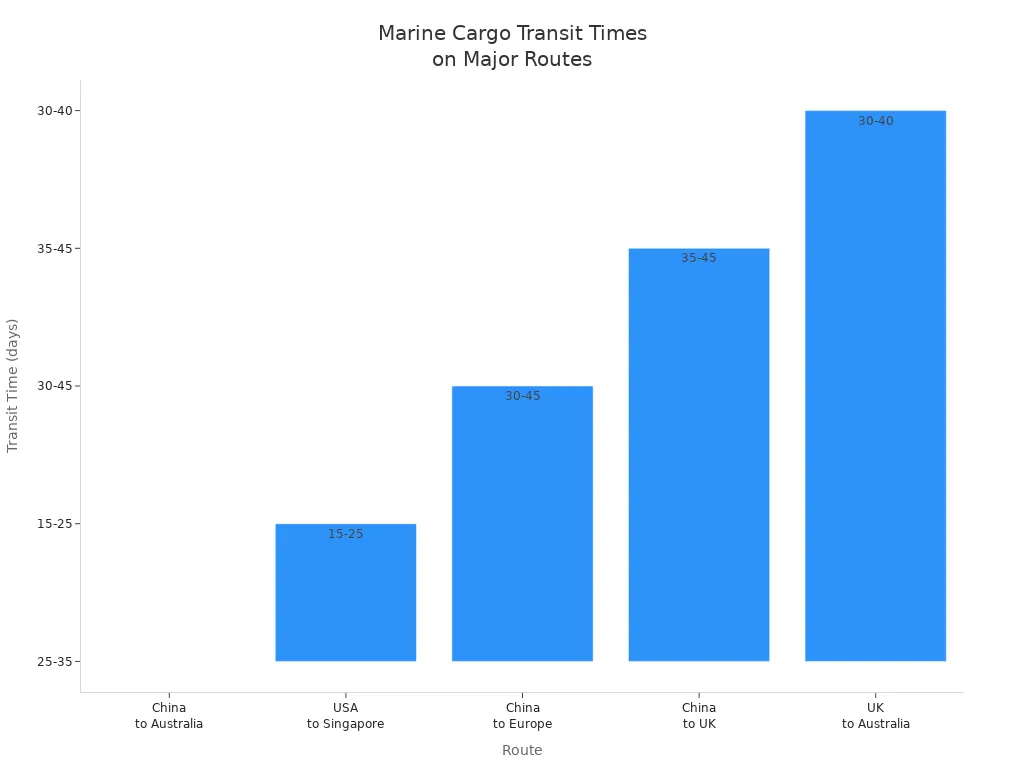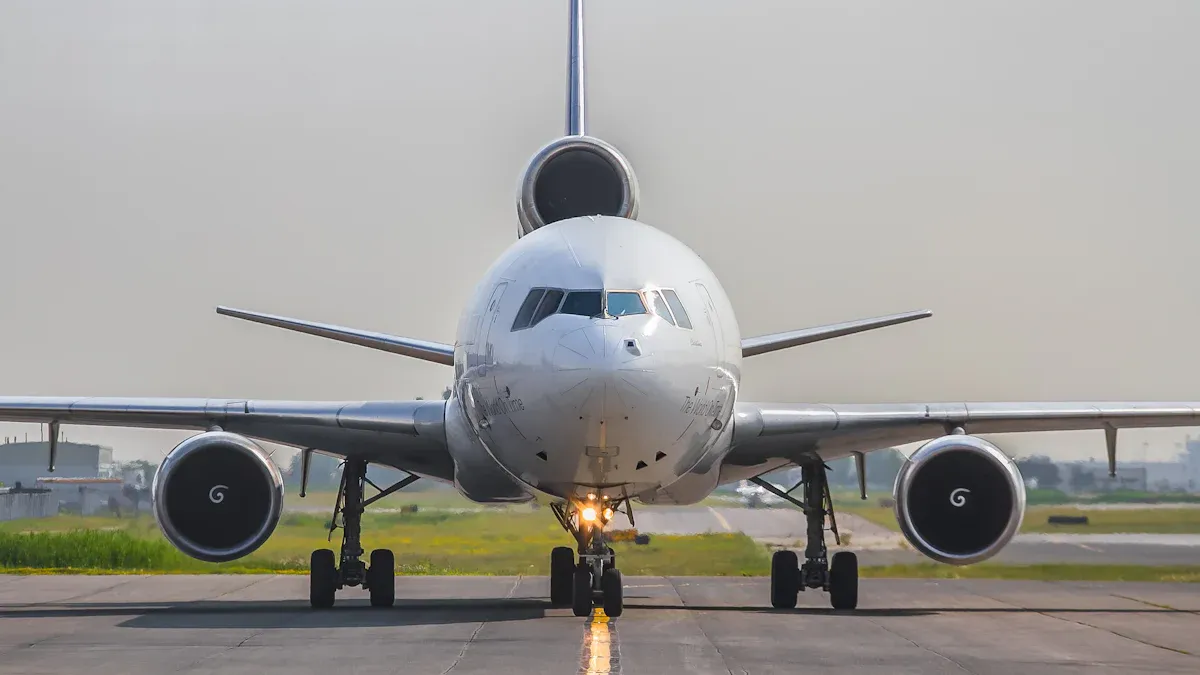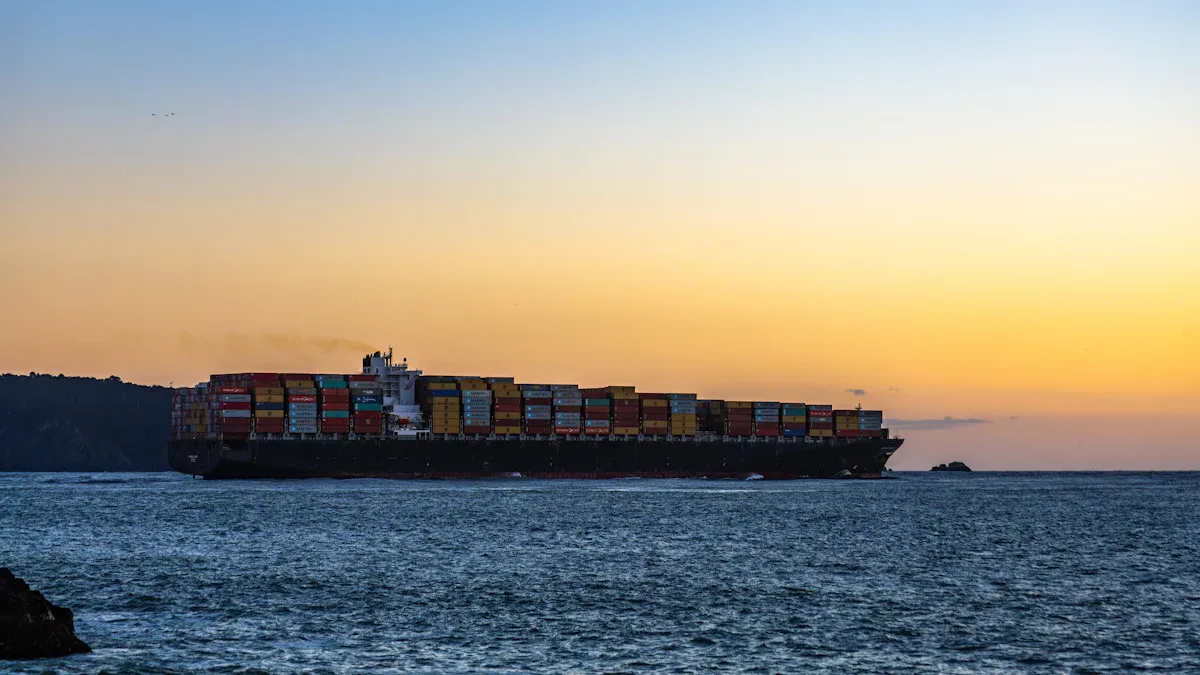Choosing Between Marine Cargo, Air, and Road Freight What Works Best for Your Business

A top electronics maker has an important choice to make. They need to pick the best way to ship goods overseas. They can use Marine Cargo Transportation, air, or road. Each choice changes the cost, speed, and safety of the cargo. Moving goods well is key for good logistics. JusLink’s smart platform helps companies move goods better. It helps with shipping cargo across world transport networks.
Key Takeaways
Pick marine cargo if you have big, heavy shipments. It saves money and is better for the environment. It is not as fast as other ways.
Use air freight when you need to send things quickly. It is good for expensive items that must arrive fast. It costs more and causes more pollution.
Choose road freight for local deliveries that need to go door-to-door. It is flexible and not too slow. The price is fair for most people.
Decision Factors
Picking the best way to ship goods is important. You need to think about cost, speed, cargo type, route, reliability, and the environment. JusLink AI Solution from JUSDA helps companies look at these things. It uses data to compare shipping choices. This helps find the best way to send each shipment.
Cost
Cost is very important when shipping freight. Marine cargo is cheaper for big shipments. Air freight costs more but is faster. Road freight is in the middle and is good for local trips. JusLink can guess freight prices and help with planning money.
Speed
Speed is needed when you must deliver fast. Air freight is the quickest. Marine cargo is the slowest. Road freight is not too fast or too slow for nearby places. The table below shows how long marine cargo takes on big routes.
Route | Transit Time (Days) |
|---|---|
China to Australia | 25-35 |
USA to Singapore | 15-25 (up to 46) |
China to Europe | 30-45 |
China to UK | 35-45 |
UK to Australia | 30-40 |

Cargo Type
Different shipping ways fit different cargo. Marine cargo is good for big, heavy, or cold items. Air freight is best for expensive or urgent things. Road freight is flexible for small loads and can go door-to-door.
Transport Mode | Best Suited Cargo Types |
|---|---|
Marine Cargo | Heavy, bulk, containers, refrigerated, vehicles |
Air Freight | High-value, urgent, lightweight goods |
Road Freight | Small loads, containers, livestock, general |
Route
The route you pick changes your shipping. Busy sea lanes can slow marine cargo. Air freight skips sea traffic but costs more. Road freight depends on roads and borders. Using more than one way can help. JusLink helps pick the best route for safe delivery.
Crowded sea lanes can slow ocean freight.
More shipping lines can help with traffic and cost.
Not enough equipment and risks like storms or pirates can change your choice.
Reliability
Getting goods on time is very important. Marine cargo can be late because of weather or busy ports. Air freight is very reliable for fast needs. Road freight depends on traffic and roads. JusLink’s AI watches for problems and helps keep things on time.
Environmental Impact
Caring for the environment is important now. Marine cargo and road freight make pollution, but big sea shipments can be better for the planet. Air freight makes the most pollution. Using more than one way can help lower harm by mixing the good parts of each.
Marine Cargo Transportation

What Is Marine Cargo?
Marine cargo transportation means using ships to move goods. Ships travel across the ocean to carry things. This way of shipping is very important for world trade. Companies use sea freight to send lots of goods between countries. Ships can carry many things like cars, electronics, and raw materials. Most goods are packed in containers or shipping containers. Ocean freight helps connect different markets around the world.
JUSDA gives advanced ocean freight services. Their technology makes shipping by sea easier and faster. JusLink’s platform shows updates in real time and lets companies track shipments. This support helps with planning and cuts down on delays.
Sea Freight Pros
Sea freight is great for moving big and heavy cargo. Ships can carry thousands of tons at once. This makes ocean freight cheaper for large loads. Sea freight is good for cargo that does not need to arrive quickly. Ocean transport uses less fuel for each ton than other ways. This helps lower harm to the environment.
Note: JUSDA’s ocean freight services use smart tools to plan routes and handle risks. Their team helps clients pick the best sea shipping for each shipment.
Sea Freight Cons
Sea freight has some problems.
Ocean transport is slower than air freight. Ships may take weeks to cross the ocean.
The price for sea freight is not good for small products.
Weather and port delays can slow down shipping.
Ocean routes can have risks like storms or pirates.
Companies must plan well when using ocean freight. JUSDA’s JusLink platform helps manage these risks and keeps shipments moving.
Best Use Cases
Marine cargo transportation is best for bulk goods, vehicles, and big shipments. Companies in electronics, automotive, and FMCG use ocean freight for global shipping. Ocean transport is good for businesses that want to save money and do not need fast delivery. JUSDA’s ocean freight services help clients move cargo safely and easily across the sea.
Air Freight
What Is Air Freight?
Air freight means moving goods by airplane. Companies use it when they need to send things fast. Air freight is one of the quickest ways to ship. It helps businesses deliver items far away in less time. Many companies pick air freight for urgent or expensive shipments. JUSDA gives strong air transport services to many countries. Their JusLink platform lets companies plan and track air freight with live updates.
Pros
Air freight gives many good things for businesses. It is the top choice for urgent or valuable shipping. The main good points are:
Benefit | Explanation |
|---|---|
Speed and Reliability | Air freight is the fastest way to ship. You can even get same-day delivery. This helps urgent cargo arrive on time. |
Security | Airports have strict security. There is less handling, so there is less risk of theft or damage. |
Locations Served | Air freight can go to faraway places. It covers many areas and has lots of flights. |
Tracking | You can track your cargo online in real time. You can see where your goods are from start to finish. |
Packaging Cost | Air freight uses light packaging. This means you do not need heavy packing, so you save money. |
JUSDA’s JusLink AI Solution helps companies pick the best air freight routes and control costs.
Cons
Air freight costs more than other ways to ship. It is not good for heavy or big cargo. Some things cannot go by air, like dangerous goods. Weather can sometimes stop flights. Air freight also causes more pollution than sea or road freight.
Ideal Scenarios
Air freight is best for urgent shipments, expensive electronics, medical supplies, or quick car parts. Companies use air freight when speed is most important. JUSDA’s air network and JusLink platform help businesses use air freight well. They make sure goods get there safely and on time.
Road Freight
What Is Road Freight?
Road freight uses trucks and other vehicles to move goods over land. This type of land freight connects factories, warehouses, stores, and homes. Road freight supports door-to-door delivery, making it a key part of many supply chains. JUSDA offers a strong road freight network with advanced tracking and value-added services. Their team helps clients manage land freight across cities and borders.
Pros
Road freight plays a major role in freight transportation. Trucks handle over 72% of all freight in the United States. Road freight is flexible and can reach almost any location. It supports last-mile delivery, which is important for e-commerce and parcel shipping. Trucks can deliver goods quickly for short and medium distances. Road freight often costs less than air or rail for trips under 1,500 miles. Fewer handling points mean less risk of damage, making it ideal for fragile cargo. Modern road freight uses GPS, IoT sensors, and AI to improve speed and safety.
Note: JUSDA’s road freight services use smart route planning and real-time tracking to help clients deliver on time.
Cons
Road freight faces some limits. Traffic jams, road work, and weather can cause delays. Fuel prices change often and can raise costs. Large or heavy cargo may need special permits. Road freight may not work well for very long distances or huge shipments. Extra services like liftgate use or residential delivery can add to the price.
When to Choose Road
Businesses should look at several factors before picking road freight:
Check if the shipment needs fast, local, or regional delivery.
Think about the size and weight of the cargo, since bigger loads cost more.
Look at the distance; road freight works best for short and medium trips.
Plan for delivery speed and avoid paying for rush services.
Watch fuel prices, as they affect shipping costs.
Consider extra services and try to save by using commercial delivery points.
Stay aware of market changes, like busy seasons or driver shortages.
JUSDA’s land freight solutions help companies adapt to changing needs. Their network and technology make road freight a smart choice for many types of freight.
Freight Solutions Comparison

Picking the right way to ship goods is important for a business. Each shipping method has its own good and bad points. Companies need to think about cost, speed, cargo type, and the environment before choosing. This freight solutions comparison shows the main differences.
Quick Reference Table
The table below lets you compare each shipping method. It helps companies pick what fits their needs best.
Feature | Marine Cargo (Sea Freight) | Air Freight | Road Freight |
|---|---|---|---|
Cost | Lowest for large loads | Highest | Moderate |
Speed | Slowest (weeks) | Fastest (days) | Medium (days) |
Best for | Heavy, bulk, containers | Urgent, high-value | Local, flexible |
Reliability | Can face delays | Very reliable | Reliable, but traffic can affect |
Environmental Impact | Lower per ton, but emissions add up | Highest emissions | Moderate emissions |
Cargo Size Limits | Very large | Limited by plane size | Limited by truck size |
Door-to-Door | Needs other transport | Needs other transport | Yes |
Multimodal Use | Common with other modes | Often combined | Key for last mile |
Tip: Multimodal freight shipping means using more than one way to move goods. This can save money and make delivery faster. Many companies use multimodal shipping to get the best mix of speed and price.
Matching Freight to Business Needs
Every business has its own shipping needs. Electronics makers might use air freight for fast delivery. Car companies often pick marine cargo for heavy parts. FMCG brands may use road freight for local trips. The best choice depends on what is most important, like cost, speed, or cargo type.
JUSDA’s JusLink AI Solution helps companies choose wisely. The platform uses real-time data to guess prices and check for risks. It can suggest the best shipping method or a multimodal plan. This helps save both money and time.
Companies with big, heavy shipments over long distances often use marine cargo.
Businesses that need fast delivery or ship expensive items pick air freight.
Road freight is best for local, flexible, or last-mile delivery.
Multimodal freight shipping mixes the good parts of each way for hard routes.
JusLink’s AI tools help companies compare choices fast. They can see how each option affects cost, speed, and the environment. This makes freight solutions comparison easy and helpful.
Ocean Freight & JUSDA Technology
JusLink AI Solution
JUSDA uses smart technology to make ocean freight better. The JusLink AI Solution lets companies see their marine cargo transportation clearly. It follows each part of the ocean trip. This tool guesses costs and helps pick the best sea routes. JusLink also gives warnings about storms or port delays. Companies use this information to make good choices for their freight. The system checks ocean freight prices and finds ways to save money. JusLink helps businesses move goods across the sea with less stress.
Note: JusLink’s AI makes ocean freight safer and more dependable. It helps companies stop problems and keep cargo moving.
Industry Applications
Many businesses use ocean freight to ship goods worldwide. Electronics makers send big orders by sea to save money. Automotive companies ship heavy parts and vehicles with marine cargo transportation. FMCG brands use ocean routes to reach new places. JUSDA gives these industries strong ocean freight solutions. The JusLink platform helps each business track shipments and handle risks. Companies in medical health and new energy also trust JUSDA for safe ocean transport. Ocean freight is good for bulk goods, containers, and things that do not need fast delivery.
Electronics: Ship devices and parts by ocean for lower costs.
Automotive: Move engines and cars with marine cargo transportation.
FMCG: Reach stores worldwide using sea and ocean routes.

JUSDA Solutions
To provide you with professional solutions and quotations.
You need to think about cost, speed, and cargo type. Reliability and the environment also matter when picking freight. JusLink helps companies make smart choices using data.
Look at what your shipping needs are
Talk to supply chain experts for advice
Pick the best way that fits your business goals
Check out JUSDA’s freight solutions to get better results.
See Also
Discover The Latest Trends In Sea Freight Logistics 2024
Comprehensive Insights Into Leading Global Logistics Firms
Effective Strategies To Reduce Logistics Costs Successfully
